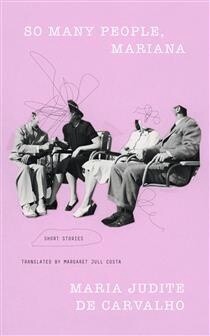So Many People, Mariana by Maria Judite de Carvalho
Long discounted by a literary culture that actively rejected women’s writing, Maria Judite de Carvalho’s biting and bitterly funny work has since exploded across the world. Collecting the entirety of her short works written between 1959 and 1967, when the Salazar dictatorship and the rigid edicts of the Catholic church reigned, the stories in So Many People, Mariana might as well have been written today. These are tough, unflinching accounts of women trapped by a culture that values them as workers or wives but not as people. And if they do escape their circumstances, they are, more often than not, irrevocably punished by the world.
Maria Judite de Carvalho (1921-1998) is widely considered one of Portugal's most important writers of the second half of the twentieth century. Born and educated in Lisbon, with a secondary education in France, Carvalho's work spans painting, journalism, and fiction, with a specialization in the short story and novella forms. A writer of great concision with an eye on modernization, the changing politics of Portugal, and the effect of contemporary life on everyday people, especially women, Carvalho published widely and to great critical acclaim in her time.
Margaret Jull Costa
